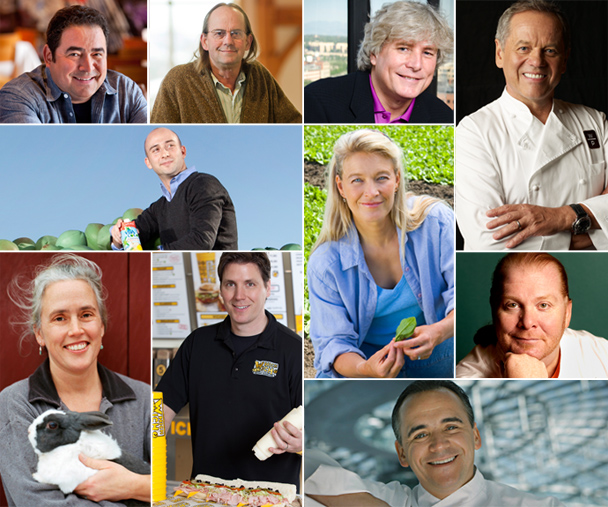What makes these 25 the premier epicurean entrepreneurs of the past quarter century? While all have founded financially successful empires (whether boutique or giant), more importantly these men and women have made a significant impact on the country’s food culture. Chefs and restaurateurs only qualified if they also established a clear—and, yes, lucrative—brand. For a retailer to make the grade, they must have maintained their integrity and hewed closely to their original vision. But haute cuisine maestro or fast-food purveyor, all 25 share one thing in common: Their businesses have shifted the axis of American taste.
1987
- Howard Schultz: Starbucks
A quarter century after he bought a small Seattle beanery, the man who replaced our cup of joe with a Salted Caramel Mocha Frappuccino made a $1.7 billion profit for the 17,000-store, 56-country coffeehouse behemoth last year—its best ever. Yet many believe he is a leader in practicing corporate responsibility: “It’s not just about winning, but the right way to win.” - Hyman Golden, Arnold Greenberg, and Leonard Marsh: Snapple
It was in 1987 that Unadulterated Food Products, Inc., a modest fruit juice outfit started by three Jewish boys from Brooklyn (as they called themselves), introduced all-natural iced tea and started a tea party that’s still going strong. The secret to their success? “We made the first ready-to-drink tea that didn’t taste like battery acid,” said Greenberg.
1988
- George Siemon: Organic Valley
This dairy farmer’s intention in starting a cooperative with a few neighbors in Wisconsin’s Kickapoo Valley was not to generate $700 million revenue (in 2011), but that’s exactly what he did. Still at the helm today—he calls himself the CEIEIO in homage to Old MacDonald—Siemon says one of his favorite axioms is: “None of us is as smart as all of us.”
1989
- Wolfgang Puck
It was in 1989 that the Austro-Californian opened his third restaurant, Postrio, thus graduating from cook to entrepreneur. Now possibly the most recognizable chef on the planet, Puck’s three brands produce everything from fast-food franchises and frozen pizza to TV shows and fancy restaurants. And he’s still a nice guy. - Nancy Silverton: La Brea Bakery
Call her the sourdough starter. The baker—and Puck alumna—who sold her La Brea empire in 2001 for $5 million-plus profit unfortunately lost it all to Bernie Madoff’s Ponzi scheme seven years later. But La Brea is now the United States’ leading artisan bread brand, and Silverton’s restarted with her (and Mario Batali’s) Mozza Restaurant Group. - Annie Withey: Annie’s
Yes, this standby for every health-conscious mom has a real Annie behind the label, and she began by handing out boxes of her organic mac and cheese outside grocery stores, printed with her home phone number for feedback. Now, Withey’s a shareholder in the $100 million-plus brand she founded, while she prefers growing produce to sell at her local farmers’ market.
1990
- Emeril Lagasse Bam!
The Massachusetts-born Cajun-ish chef burst onto the scene with his first restaurant, Emeril’s, New Orleans, and proceeded to penetrate the pop culture with product lines (now owned by Martha Stewart), TV shows, and more than a dozen restaurants. And he continues to kick it up a notch, with an estimated $150 million annual revenue.
1991
- Martha Stewart: Martha Stewart Living Omnimedia
A couple of decades ago the doyenne of the domestic launched Martha Stewart Living magazine, thus unleashing the power of Omnimedia—the company she took public in 1999. Despite setbacks (canceled talk show; jail), Stewart’s stuff—towels to houses—plus books and TV, still sells to the tune of about $230 million a year. As she puts it: “When you’re through changing, you’re through.” And that, according to her catchphrase, is “a good thing.”
1992
- Annie Chun: Annie Chun’s
What is it with Annies and food entrepreneurship? Chun, like Withey, leveraged small beginnings—selling bottles of homemade sauces at the Marin County Farmers’ Market—into an all-natural packaged Asian food company that’s been growing exponentially since its 2005 alliance with the South Korea–based CJ Corp. She previously worked all jobs at her family’s Korean restaurant: “I didn’t know it at the time, but I was getting the experience I would need later on.” So, kids, bussing tables can be fruitful.



 Pinterest
Pinterest


